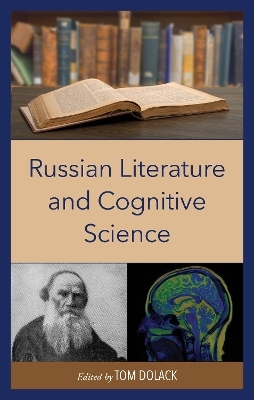
Russian Literature and Cognitive Science
Lexington Books/Fortress Academic (Verlag)
978-1-6669-4169-2 (ISBN)
- Noch nicht erschienen
- Versandkostenfrei
- Auch auf Rechnung
- Artikel merken
Russian Literature and Cognitive Science applies the newest insights from cognitive psychology to the study of Russian literature. Chapters focus on writers and cultural figures from the Golden to the Internet Age including: Pushkin, Dostoevsky, Tolstoy, Sologub, Bely, Akhmatova, Nabokov, Baranskaya, and contemporary online discourse. The authors draw on a wide array of cognitively-informed fields within psychology and related disciplines and approaches such as social psychology, visual processing, conceptual blending, cognitive narratology, the study of autism, cognitive approaches to creativity, the medical humanities, reader reception theory, cognitive anthropology, psychopathology, psychoanalysis, Theory of Mind, visual processing, embodied cognition, and predictive processing. This volume demonstrates how useful a tool cognitive science is for the analysis of literary texts.
Tom Dolack is senior professor of the Practice of Russian at Wheaton College.
Preface
Introduction Tom Dolack
Chapter 1: Pushkin's “The Stationmaster”: Morality Meets Sexual Selection David Bethea
Chapter 2: Flow and Selfhood in Leo Tolstoy's Anna Karenina: A Case Study of the Mowing Scene David S. Danaher
Chapter 3: Facial Imagery, Reader Visualization, and the Visual Ethics of War and Peace Sarah B. Mohler
Chapter 4: A Multilevel Cognitive Approach to Pushkin Tom Dolack
Chapter 5: Staying Imperturbable in the Face of Fate: Alexander Pushkin’s Gothic Stories Conveying the Code of Honor in the Face of the Supernatural Ekaterina Chelpanova
Chapter 6: (Un)Reading and the “Gappiness” of Context: Towards a New Cognitive Reception Theory Katherina B. Kokinova
Chapter 7: Re-Visioning Despair: The Medical Gaze in Sologub’s The Petty Demon Kelly Knickmeier Cummings
Chapter 8: Autism in Nabokov’s The Defense Brett Cooke
Chapter 9: Provocation and Pre-Diction: Terrorist Realism as a Narrative Mode in the Russian Imperium’s Prose 1862-1914 (Particularly in Andrei Bely’s Petersburg, 1913) Michał Mrugalski
Chapter 10: Mass Shooters as Underground Men of the 21st Century Irina Meier
Chapter 11: Russian Cognitive Approaches for Studying Genres of Contemporary Electronic Communication: Interpreting “Sincere Conversations” in New Media Anna Novikova and Julia Lerner
Chapter 12: Dream (Re)Interpretation: Metaphors and Story Schemas in Meaning Creation Anna A. Lazareva
Chapter 13: Intersections between Language, Social Norms, and Individual Cognition in Natalya Baranskaya’s A Week like Any Other Angelina Rubina
Chapter 14: Cognitive Aspects of Deixis and Semantic Poetics of Anna Akhmatova and Joseph Brodsky Denis Akhapkin
About the Contributors
| Erscheint lt. Verlag | 15.11.2024 |
|---|---|
| Reihe/Serie | Crosscurrents: Russia's Literature in Context |
| Co-Autor | Tom Dolack, Denis Akhapkin, David Bethea, Ekaterina Chelpanova |
| Sprache | englisch |
| Maße | 152 x 229 mm |
| Themenwelt | Geisteswissenschaften ► Psychologie ► Allgemeine Psychologie |
| Geisteswissenschaften ► Psychologie ► Sozialpsychologie | |
| Geisteswissenschaften ► Psychologie ► Verhaltenstherapie | |
| Geisteswissenschaften ► Sprach- / Literaturwissenschaft ► Anglistik / Amerikanistik | |
| Geisteswissenschaften ► Sprach- / Literaturwissenschaft ► Literaturwissenschaft | |
| ISBN-10 | 1-6669-4169-7 / 1666941697 |
| ISBN-13 | 978-1-6669-4169-2 / 9781666941692 |
| Zustand | Neuware |
| Informationen gemäß Produktsicherheitsverordnung (GPSR) | |
| Haben Sie eine Frage zum Produkt? |
aus dem Bereich


